#rhetoric
Text
Latin Literature Tournament - Round 1


Propaganda under the cut!
Cicero Propaganda:
This is literally the Cicero Website! You're gonna be on Classics Tumblr and not vote for him??
He saved the republic, you know
All kidding aside, he genuinely wrote some of the most marvelous prose in the Latin language
Martial Propaganda:
Dude basically invented the modern epigram
Was a Huge Bitch and could sling trash talk like no other. A funnier motherfucker you will never meet
Additional propaganda from his dear friend Pliny
#tagamemnon#cicero#martial#latin literature tournament#tournament poll#bracket#classics#ancient rome#epigram#rhetoric#tumblr polls
71 notes
·
View notes
Text
It seems like one of the biggest and most common mental hangups I find in almost everyone is a failure to adapt to superseding concepts.
That's to say, sometimes, earlier on in life or in understanding of something, you will be told a simplified version of the truth, often a black and white silhouette of an idea. However, the more you learn, the more you're meant to find the shades, the blurriness, the nuances of everything. It seems like many people don't understand this, or more accurately, are never rewarded for doing this.
The issue seems to be that on a rhetorical level, the most easily transmissible ideas are those black and white statements, the ones that punch the best. Most people don't attempt to engage in concepts on a deeper level out of their own interest, so if all they are surrounded by is surface level statements, their understanding of the world will never advance beyond a surface level.
This is what happens with bigots when they are confronted with actually interacting with the people they choose to hate on a more personal level. To even speak to someone is to treat them in some way as a person, and so, while they almost never budge on anything that doesn't directly affect their life even after these sorts of learning experiences, they are forced to add shade on something they desperately want to be black and white. Obviously, many people's delusions win out even with direct contact, but still.
This also most certainly affects leftist spaces. It feels like there are two different kinds of leftist spaces, ones where the solution to differences is to put up harsh walls and outlines between everything and police those rules strictly, and the other where the solution is to let them intermix and talk it out. It's sadly difficult to simply cast away that first one, the silhouette, when it comes to politics, because even progressive groups need to consolidate together to push on a rhetorical level for cultural acceptance and systematic changes, but the internals cannot reflect this idea, because it simply isn't how anything should work. It's a defensive reaction to difference, drawing lines around yourself so everything makes clear and simple sense.
Absolutism is a philosophy for children, but that doesn't mean it's bad. It just means that we're meant to graduate from that eventually. Allow yourself to see the grey, and you might find that there's a beauty to the shading.
#advice#essay#essay writing#mini rant#rant post#rant#personal rant#politics#sociology#learning#special interest#writing#mini essay#rhetoric
48 notes
·
View notes
Text
I feel like the Hbomberguy plagiarism video has a lot of really good lessons about building an argument.
Like, the thesis of the video isn't just "Plagiarism is rife on Youtube", although that point was certainly well made, it was specifically about James Somerton, who isn't mentioned until about halfway through the video.
Before then, Hbomb goes through several creators who are already widely discredited as plagiarists, and in each section he introduces concepts that are later incorporated into the final takedown of Somerton, but each section also stands on it's own.
Like, he starts with Filip, the game reviewer, which he uses to introduce the format of how he will discuss and expose plagiarists. Specifically, the graphic of displaying the source material while the plagiarist's voice plays, and marking up said source material every time the plagiarist changes some wording slightly. This is the method that Hbomb uses across the entire video.
With Illuminaughtii, Hbomb introduces a few major concepts
1) The idea of Insufficient citation. Illuminaughtii "Cites" her sources by putting a plaintext pastebin link in her video descriptions with no indication of how each source was used. Technically, her source is CITED, but not in any relevant or useful way. She has a big list of stuff she read, and a random youtube link in there happens to be the source that she stole 90% of the video from.
2) He introduces the profit motive behind this approach. Putting out a lot of content very quickly is how one builds an audience, and therefore an income, out of making stuff on youtube. Plagiarism of this sort is a way to produce content very quickly and build a following.
The Internet Historian section introduces two new concepts:
1) The behavior of an exposed plagiarist, taking down and reuploading videos with minor changes, awkwardly trying to insert credit without admitting guilt.
2) That the plagiarists are stealing not just research, but STYLE. Previous sections go over how the plagiarists are reusing the same words, but this section oozes over how much of the final product's quality was the result of how well the source material was written. TIH didn't just crib the notes from the Mentalfloss article, he created a video heavily dependent on the original author's skill as a writer. When TIH tried his own hand at presenting the same set of facts, it came out much worse.
So that when the time comes for the Somerton takedown, Hbomb has already laid the groundwork to bring these concepts back. Somerton takes down and reuploads videos when he's caught, he declares this his video is "based on" work by somebody else without providing proper citation. He's not just stealing research done by somebody else, he's taking their insights and talent as a writer and regurgitating it as his own, and he's doing so to churn out a vast wall of content that he can financially benefit from, and he doesn't need to tell you why this is important, because he's already done so. He already convinced you that Illuminaughtii hiding a line in a pastebin didn't excuse her plagiarism, so you don't need to be told why Somerton saying his video is "Based On" somebody else's book doesn't excuse it.
11K notes
·
View notes
Text
tools not rules: the importance of critical thinking
More than once, I’ve talked about the negative implications of Evangelical/purity culture logic being uncritically replicated in fandom spaces and left-wing discourse, and have also referenced specific examples of logical overlap this produces re, in particular, the policing of sexuality. What I don’t think I’ve done before is explain how this happens: how even a well-intentioned person who’s trying to unlearn the toxic systems they grew up with can end up replicating those systems. Even if you didn’t grow up specifically in an Evangelical/purity context, if your home, school, work and/or other social environments have never encouraged or taught you to think critically, then it’s easy to fall into similar traps - so here, hopefully, is a quick explainer on how that works, and (hopefully) how to avoid it in the future.
Put simply: within Evangelism, purity culture and other strict, hierarchical social contexts, an enormous value is placed on rules, and specifically hard rules. There might be a little wiggle-room in some instances, but overwhelmingly, the rules are fixed: once you get taught that something is bad, you’re expected never to question it. Understanding the rules is secondary to obeying them, and oftentimes, asking for a more thorough explanation - no matter how innocently, even if all you’re trying to do is learn - is framed as challenging those rules, and therefore cast as disobedience. And where obedience is a virtue, disobedience is a sin. If someone breaks the rules, it doesn’t matter why they did it, only that they did. Their explanations or justifications don’t matter, and nor does the context: a rule is a rule, and rulebreakers are Bad.
In this kind of environment, therefore, you absorb three main lessons: one, to obey a rule from the moment you learn it; two, that it’s more important to follow the rules than to understand them; and three, that enforcing the rules means castigating anyone who breaks them. And these lessons go deep: they’re hard to unlearn, especially when you grow up with them through your formative years, because the consequences of breaking them - or even being seen to break them - can be socially catastrophic.
But outside these sorts of strict environments - and, honestly, even within them - that much rigidity isn’t healthy. Life is frequently far more complex and nuanced than hard rules really allow for, particularly when it comes to human psychology and behaviour - and this is where critical thinking comes in. Critical thinking allows us to evaluate the world around us on an ongoing basis: to weigh the merits of different positions; to challenge established rules if we feel they no longer serve us; to decide which new ones to institute in their place; to acknowledge that sometimes, there are no easy answers; to show the working behind our positions, and to assess the logic with which other arguments are presented to us. Critical thinking is how we graduate from a simplistic, black-and-white view of morality to a more nuanced perception of the world - but this is a very hard lesson to learn if, instead of critical thinking, we’re taught instead to put our faith in rules alone.
So: what does it actually look like, when rule-based logic is applied in left-wing spaces? I’ll give you an example:
Sally is new to both social justice and fandom. She grew up in a household that punished her for asking questions, and where she was expected to unquestioningly follow specific hard rules. Now, though, Sally has started to learn a bit more about the world outside her immediate bubble, and is realising not only that the rules she grew up with were toxic, but that she’s absorbed a lot of biases she doesn’t want to have. Sally is keen to improve herself. She wants to be a good person! So Sally joins some internet communities and starts to read up on things. Sally is well-intentioned, but she’s also never learned how to evaluate information before, and she’s certainly never had to consider that two contrasting opinions could be equally valid - how could she have, when she wasn’t allowed to ask questions, and when she was always told there was a singular Right Answer to everything? Her whole framework for learning is to Look For The Rules And Follow Them, and now that she’s learned the old rules were Bad, that means she has to figure out what the Good Rules are.
Sally isn’t aware she’s thinking of it in these terms, but subconsciously, this is how she’s learned to think. So when Sally reads a post explaining how sex work and pornography are inherently misogynistic and demeaning to women, Sally doesn’t consider this as one side of an ongoing argument, but uncritically absorbs this information as a new Rule. She reads about how it’s always bad and appropriative for someone from one culture to wear clothes from another culture, and even though she’s not quite sure of all the ways in which it applies, this becomes a Rule, too. Whatever argument she encounters first that seems reasonable becomes a Rule, and once she has the Rules, there’s no need to challenge them or research them or flesh out her understanding, because that’s never been how Rules work - and because she’s grown up in a context where the foremost way to show that you’re aware of and obeying the Rules is to shame people for breaking them, even though she’s not well-versed in these subjects, Sally begins to weigh in on debates by harshly disagreeing with anyone who offers up counter-opinions. Sometimes her disagreements are couched in borrowed terms, parroting back the logic of the Rules she’s learned, but other times, they’re simply ad hominem attacks, because at home, breaking a Rule makes you a bad person, and as such, Sally has never learned to differentiate between attacking the idea and attacking the person.
And of course, because Sally doesn’t understand the Rules in-depth, it’s harder to explain them to or debate with rulebreakers who’ve come armed with arguments she hasn’t heard before, which makes it easier and less frustrating to just insult them and point out that they ARE rulebreakers - especially if she doesn’t want to admit her confusion or the limitations of her knowledge. Most crucially of all, Sally doesn’t have a viable framework for admitting to fault or ignorance beyond a total groveling apology that doubles as a concession to having been Morally Bad, because that’s what it’s always meant to her to admit you broke a Rule. She has no template for saying, “huh, I hadn’t considered that,” or “I don’t know enough to contribute here,” or even “I was wrong; thanks for explaining!”
So instead, when challenged, Sally remains defensive: she feels guilty about the prospect of being Bad, because she absolutely doesn’t want to be a Bad Person, but she also doesn’t know how to conceptualise goodness outside of obedience. It makes her nervous and unsettled to think that strangers could think of her as a Bad Person when she’s following the Rules, and so she becomes even more aggressive when challenged to compensate, clinging all the more tightly to anyone who agrees with her, yet inevitably ending up hurt when it turns out this person or that who she thought agreed on What The Rules Were suddenly develops a different opinion, or asks a question, or does something else unsettling.
Pushed to this sort of breaking point, some people in Sally’s position go back to the fundamentalism they were raised with, not because they still agree with it, but because the lack of uniform agreement about What The Rules Are makes them feel constantly anxious and attacked, and at least before, they knew how to behave to ensure that everyone around them knew they were Good. Others turn to increasingly niche communities and social groups, constantly on paranoid alert for Deviance From The Rules. But other people eventually have the freeing realisation that the fixation on Rules and Goodness is what’s hurting them, not strangers with different opinions, and they steadily start to do what they wanted to do all along: become happier, kinder and better-informed people who can admit to human failings - including their own - without melting down about it.
THIS is what we mean when we talk about puritan logic being present in fandom and left-wing spaces: the refusal to engage with critical thinking while sticking doggedly to a single, fixed interpretation of How To Be Good. It’s not always about sexuality; it’s just that sexuality, and especially queerness, are topics we’re used to seeing conservatives talk about a certain way, and when those same rhetorical tricks show up in our fandom spaces, we know why they look familiar.
So: how do you break out of rule-based thinking? By being aware of it as a behavioural pattern. By making a conscious effort to accept that differing perspectives can sometimes have equal value, or that, even if a given argument isn’t completely sound, it might still contain a nugget of truth. By trying to be less reactive and more reflective when encountering positions different to your own. By accepting that not every argument is automatically tied to or indicative of a higher moral position: sometimes, we’re just talking about stuff! By remembering that you’re allowed to change your position, or challenge someone else’s, or ask for clarification. By understanding that having a moral code and personal principles isn’t at odds with asking questions, and that it’s possible - even desirable - to update your beliefs when you come to learn more than you did before.
This can be a scary and disquieting process to engage in, and it’s important to be aware of that, because one of the main appeals of rule-based thinking - if not the key appeal - is the comfort of moral certainty it engenders. If the rules are simple and clear, and following them is what makes you a good person, then it’s easy to know if you’re doing the right thing according to that system. It’s much, much harder and frequently more uncomfortable to be uncertain about things: to doubt, not only yourself, but the way you’ve been taught to think. And especially online, where we encounter so many more opinions and people than we might elsewhere, and where we can get dogpiled on by strangers or go viral without meaning to despite our best intentions? The prospect of being deemed Bad is genuinely terrifying. Of course we want to follow the Rules. But that’s the point of critical thinking: to try and understand that rules exist in the first place, not to be immutable and unchanging, but as tools to help us be better - and if a tool becomes defunct or broken, it only makes sense to repair it.
Rigid thinking teaches us to view the world through the lens of rules: to obey first and understand later. Critical thinking teaches us to use ideas, questions, contexts and other bits of information as analytic tools: to put understanding ahead of obedience. So if you want to break out of puritan thinking, whenever you encounter a new piece of information, ask yourself: are you absorbing it as a rule, or as a tool?
10K notes
·
View notes
Text
This is a super good article and I recommend reading it. Also, the figleaf trick is literally what every conspiracy theorist who says "I'm not saying you have to believe me or that I'm right about everything, I'm just putting this out there for you to consider" is doing. For example, if a conspiracy theorist wasn't a straight-up antivaxxer trying to spread antivax beliefs, they wouldn't ask you to even consider the possibility that vaccines are being used to microchip people, alter their DNA, whatever. If a conspiracy theorist wants you to "consider the possibility," they want you to believe it and base your future choices on it, period.
#figleaves#figleafing#rhetoric#right wing rhetoric#far right rhetoric#conspiracist rhetoric#conspiracy theory rheotoric#politics#conspiracy theories#conspiracy theorists
867 notes
·
View notes
Text
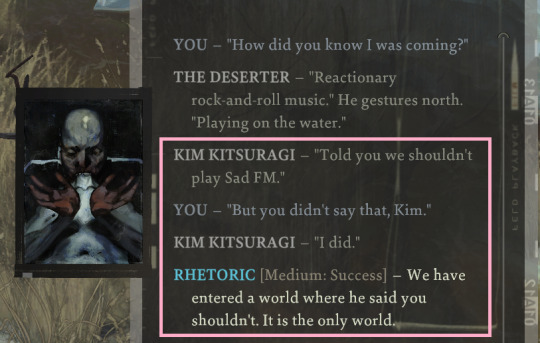
They are a married couple
2K notes
·
View notes
Text
Somewhere out there is an essay about superhero movies where villains co-opt, misuse, or even just misunderstand the language of the left to push methods and goals that are incompatible with the actual theory of the left, but that sound Right And Good to viewers who aren't thinking it through entirely. And the essay is not just about how they compare to each other, but how they are a litmus test for viewers to know how susceptible they are to propaganda.
Co-opt: Most obvious example and the inspiration for this post is the Riddler in Batman (2020, the one with RPatt). The Riddler recites leftist rhetoric about corruption, wealth hoarding, and redistribution, but his actual actions and goals are unrelated. He's an accelerationist who's more interested in tearing down a system that didn't benefit HIM than in actually rectifying the problems, and who cares if a few kids get traumatized or even killed along the way?
Misuse: Easy mode, this one's Thanos. He talks about ensuring there's enough for everyone to eat, but like. Bro.
Misunderstand: Erik Killmonger, who has the benefit of both some incredibly legitimate grievances and a pretty face, but also kind of fails at the idea of intersectionality, proportionality, or Start With Words Before You Escalate. He's the easiest to sympathize with, because he has some really good points and ultimately does appear to be legitimately pursuing those goals... but he's also a misogynist, jumped to international terrorism before "call up my cousin who doesn't know I exist," and there's something in there about the role played by his time in the US military, which gave him emotional trauma, head trauma, and a sincere belief in the validity of US-style insurgency operations based on hostile takeovers of inconvenient countries. He's charming and pretty and sincere... he's just also, in many ways, wrong. And the parts where he's right makes it easy to try to ignore the bits where he's wrong if you're predisposed to like him and prefer some absolutism.
Anyway, yeah, there are definitely other examples, but the ones that were suggested to me didn't quite vibe with the base idea (Mysterio and Vulture both had disgruntled union moments in the MCU, but they left those roots so quickly that I don't think the concept of using leftist rhetoric as cover/justification for the crimes really applies since, they very quickly shift gears into revenge and greed respectively).
Someone's probably done this better orz.
#mcu#dc#marvel cinematic universe#batman 2022#the riddler#Edward Nashton#thanos#black panther#erik killmonger#phoenix posts#meta#rhetoric#propaganda
389 notes
·
View notes
Text
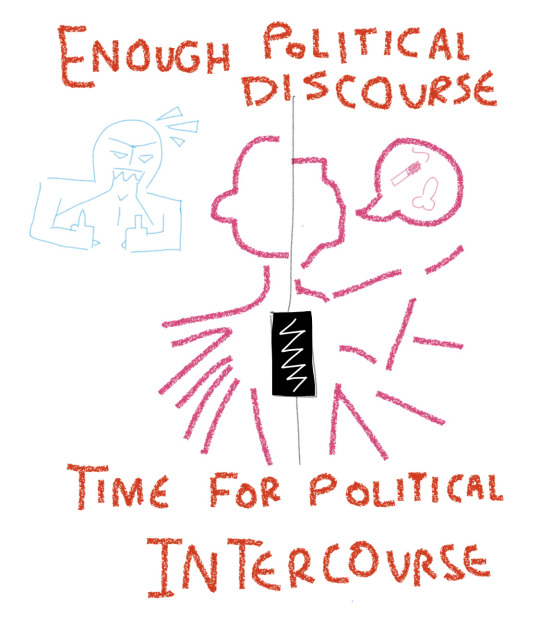
quick phone doodle of electrochemistry + pissed off rhetoric
532 notes
·
View notes
Text
The funniest thing about James Somerton's repeated apology videos (I'm more than willing to bet there will be a third) is that he very clearly didn't watch Hbomberguy's exposé.
If he did, he probably would not have used tactics Harris explicitly anticipated him using, e.g. throwing Nick under the bus, using Filip-esque excuses for why the plagiarism happened while not owning up to the worst of his actions (e.g. sending his fans to harass that one twitter user), and many more obvious manipulations that anyone who had seen the video should have been inoculated against.
Either he didn't see the video and had it vaguely recounted to him by Twitter Discourse[tm], or he's banking on the people seeing his apology having not seen Hbomberguy's video--a video with 18 million views as it stands, which is several times more than the entirety of the sum of the views on his remaining videos.
Either way, it shows not just his dishonesty, but his stupidity as well.
259 notes
·
View notes
Quote
A person who speaks like a book is exceedingly boring to listen to; sometimes, however, it is not inappropriate to talk in that way. For a book has the remarkable property that it can be interpreted any way you wish. If one talks like a book one’s conversation acquires this property too.
Søren Kierkegaard, Either/Or
#philosophy#quotes#Søren Kierkegaard#Either/Or#books#speech#talking#conversation#rhetoric#interpretation
402 notes
·
View notes
Text

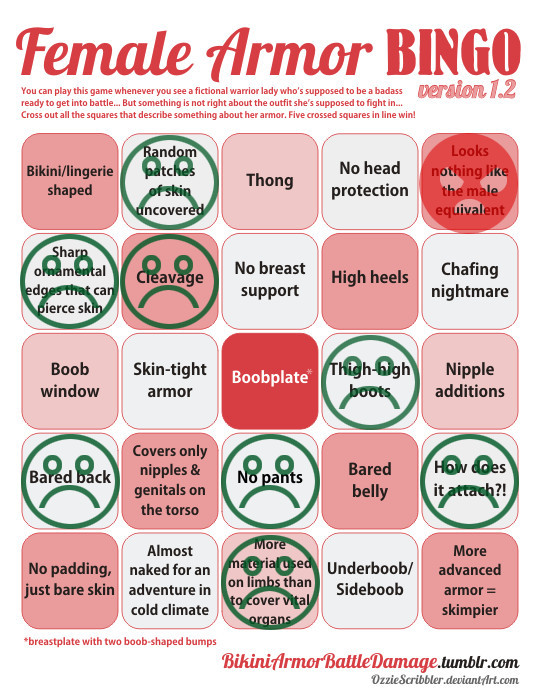
Granblue Fantasy, "Woke" International Standards and pandering to toxic trash gamers
So, I'm not going to name him because I don't particularly want his fans finding it via searches and sending me weird nonsense to my inbox, and honestly I don't want people who don't know him receiving psychic damage due to exposure to his opinions - but a certain streaming personality whose primary contribution is toxicity is getting angry that various mega-corporations that happen to originate in East Asia are continuing to focus on marketing broadly to get the most sales, rather than just pandering to miserable straight white men who are scared of anyone different to them.

Basically the same people who used to scream "Sex sells! Deal with it! Facts don't care about your feelings!" are now having breakdowns when it turns out massive mega-corporations don't want to be their friend/nanny/punching-bag, they want to make as much money as possible and the obvious way to achieve that is to broaden their audience, to make more people interested in buying their game.
Because the $100 from a personal with a marginalized identity who joins the series midway, spends exactly as well as the $100 for the cishet white guy who then goes on to start a harassment campaign against a developer via his social media clout, and uses the proceeds to buy Hot Pockets and bootleg NSFW merchandise (I assume).
Granblue Fantasy is a game series which has... largely resisted this trend. It's been releasing games, etc for ten years so, so many depictions of the player characters could be used as an illustration of our double standards tag.





(Also the male protagonist, Gran, is the one the series is named for when translated into English... there is no Djeetablue Fantasy - despite the many attempts by the fanbase to use memes to manifest it. However her name is incorporated into the native Japanese title... nobody tell him in case he decides that's "woke".)
So this guy who screams about studios who go woke, and was 100% going to play the latest entry in it... he'd support it right?
Nah, he complained he didn't like the story, he didn't get it and posted videos of him doing his signature "this is so bad" face. Man who lives off Hot Pockets and has unreasonable expectations of everyone else, failed to have his expectations met.
It's probably good he bailed out there before he found out that Granblue Fantasy, and a lot of game series like it - often have a lot of female fans who are in it for the story, the characters, the cute boys and the generally fun of the world.... all the stuff he hates.
If you doubt this, there's a foolproof way to check....

Oh wow I wonder why more and more studios are deciding it's a bad idea to court the attention of guys like him.
-wincenworks
#granblue fantasy#female armor bingo#commentary#double standards#bikini armor#plate armor#image#fantasy#RPG#video games#Bikini Armor Battle Damage#BikiniArmorBattleDamage#BABD#marketing#rhetoric
188 notes
·
View notes
Text
Latin Literature Tournament - Round 1


Propaganda under the cut!
Tacitus Propaganda:
Balances really grand and expressive tone with a really concise and truncated style, which makes for some really dynamic passages
Reading Tacitus lowkey feels like watching a really good prestige period drama
One of my colleagues used to call Tacitus "Daddy." I didn't really get it, and then I saw this statue. And you know what? Yeah. Daddy.
Cato Propaganda:
Wrote extensively on how to make better wine, helping keep Rome stocked with the good stuff for centuries
He's got a piece of the fucking moon named after him, guys. The moon.
Moreover, Carthage must be destroyed
#tagamemnon#tacitus#cato#cato the elder#latin#latin literature#latin literature tournament#tournament polls#tumblr polls#bracket#history#agriculture#wine#rhetoric#carthage
22 notes
·
View notes
Text
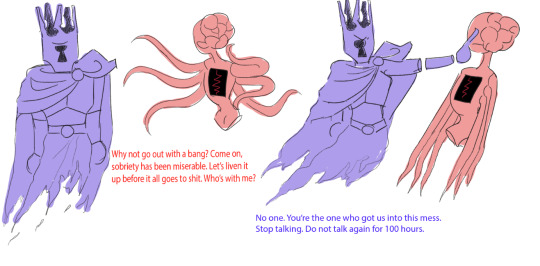
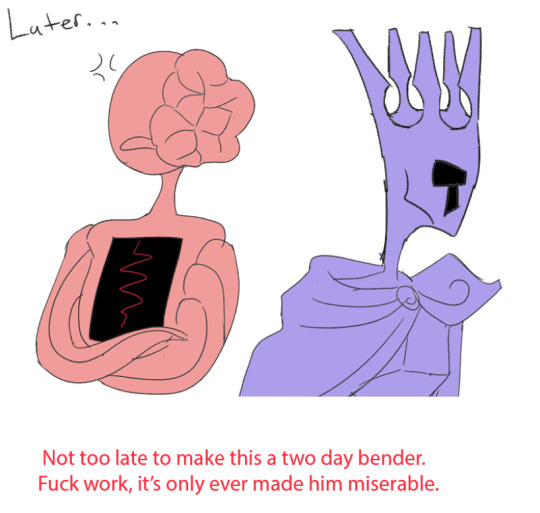

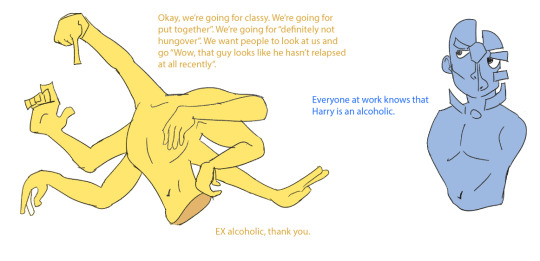
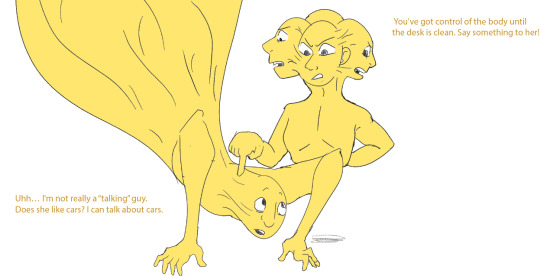
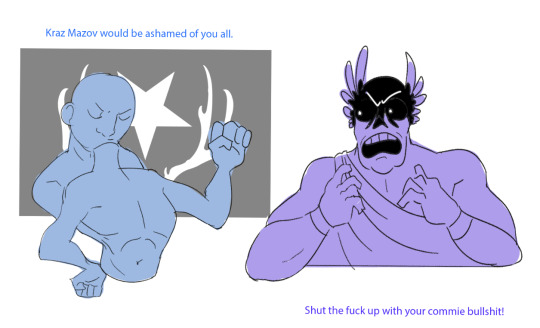
some skills shenanigans from my fic
#the headmates are fightinnnngg#elchem is so fun to draw#disco elysium#skills disco elysium#rhetoric#authority#hand/eye coordination#reaction speed#volition#electrochemistry#logic#interfacing#toadart#fanart#art
153 notes
·
View notes
Text
Just when I thought I couldn’t love Rhetoric more, I found out what the Highest Passive Rhetoric Check in Disco Elysium is:
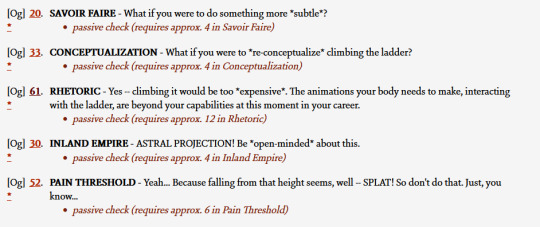
That’s Right. When you max out your Rhetoric skill, you become the king of cutting through bullshit. It fully breaks the fourth wall, looks you in the eyes, and says, “We’re gonna teleport you because we don’t have the money to animate you climbing a ladder.”
921 notes
·
View notes
Text
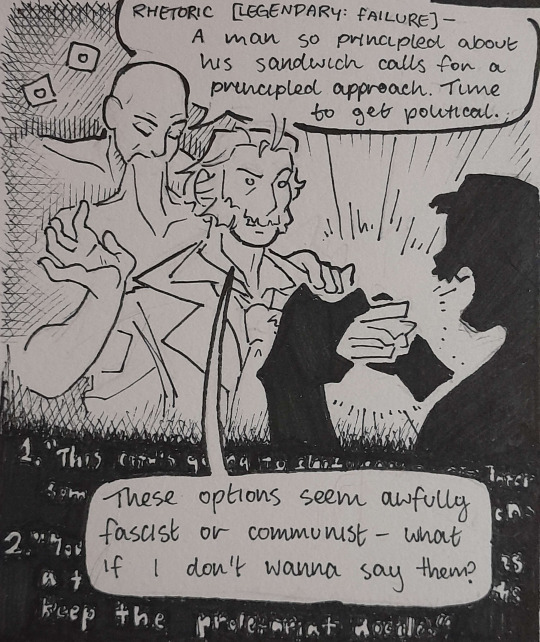
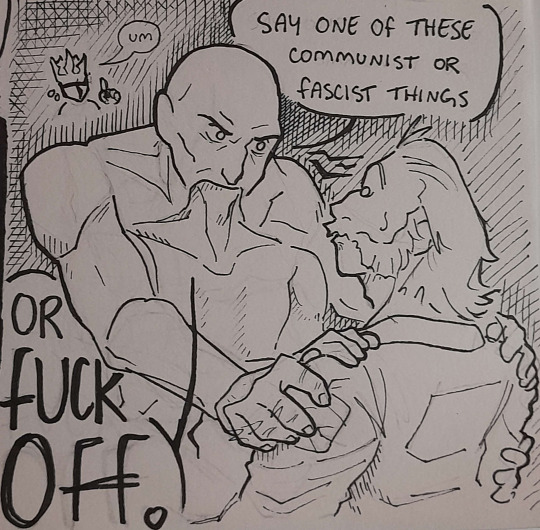
[Image description: In the first image, Harry Du Bois, looking at Gaston Martin's sandwich, fails the check to ask if he can have it. Rhetoric says, "A man so principled about his sandwich calls for a principled approach. Time to get political." Harry, seeing his options, asks, "These options seem awfully fascist or communist - what if I don't wanna say them?" In the second image, Rhetoric takes Harry by the shoulders and tells him, "Say one of these communist or fascist things, or fuck off." Harry appears shocked. In the background, Volition raises a finger and says, "um". End ID.]
skilltober 3!! please forgive the mistakes (see: the fucked up text in the first image) my hands are sooo shaky lately so I'm blaming that. hyperfocusing on one spot without taking into consideration the rest of the image is also my specialty. i figured out why the lighting was weird in the last one though at least!!!
more rhetorics + my cat who decided to jump up and run away with my eraser in her mouth as soon as I had everything ready to take the photo



#found my pencil btw so i could do a pre-sketch for this one#did NOT save it though. my hands...#disco elysium#parcark art tag#skilltober#skilltober03#also you know how my psych teacher took my book yesterday to look at my encyclopedia and I shit my pants#well. the student teacher in my art class today *recognised* what I was drawing.#I will explode#for organisation ->#harry du bois#rhetoric#the skills#described
337 notes
·
View notes
Text
I noticed a version of this depressing-ass post going around my dash, and I wanted to mention something like that I've noticed in a lot of Highbrow Leftist Critique that I'm really fucking sick of.
Namely, please don't fucking talk about it like it's inevitable and it's already happened rather than a thing we can stop, because People Won't Change It.
Like, as an autistic person who has A Complex due to being let down by people constantly in their life both personally and politically, it does not make me want to change things.
It makes me feel feel helpless and useless and scared, it makes me not want to bother doing anything, because why bother if the tools you use are going to be wrecked.
Not only that, it also makes me feel like the people don't have my back, because that's the underlying assumption I see behind most of them. That it is inevitable because The Horde does not want it.
This is an example of misanthropy posing as enlightenment. It is also fucking poison for any sort of collective action.
Like @headspace-hotel talks about a frustration with that in environmental movements too, and given digital stuff is near and dear to my heart too, I now know how she feels.
Like, I learned a new thing to panic about with the fucking Windows thing (here's how to un-mandate that fucking chip) but not much else!
But there are folks in the reblogs who're actually advocating shit to do about this, shoutout to @dominateeye and @aleran for doing good work, and I suppose that's my point.
Do better, don't let your pessimism become a social contagion, and advocate current action rather than predicting inevitable despair...
...Also; if you're in the US; call your congresspeople about killing these bad copyright bills and this bad censorship bill, because those are the major pathways that hypothetical DRM hellscape is going to use to get their hooks in.
1K notes
·
View notes